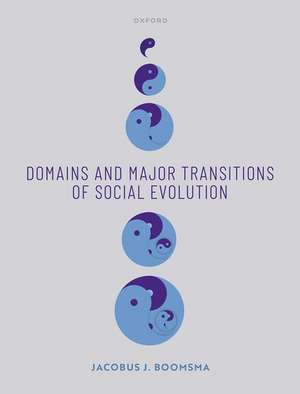Domains and Major Transitions of Social Evolution
Autor Koos Boomsmaen Limba Engleză Paperback – 3 noi 2022
Preț: 325.27 lei
Preț vechi: 351.50 lei
-7% Nou
Puncte Express: 488
Preț estimativ în valută:
62.25€ • 64.75$ • 51.39£
62.25€ • 64.75$ • 51.39£
Carte disponibilă
Livrare economică 11-17 martie
Livrare express 08-14 martie pentru 67.60 lei
Preluare comenzi: 021 569.72.76
Specificații
ISBN-13: 9780198746188
ISBN-10: 0198746180
Pagini: 320
Dimensiuni: 247 x 190 x 15 mm
Greutate: 0.68 kg
Editura: OUP OXFORD
Colecția OUP Oxford
Locul publicării:Oxford, United Kingdom
ISBN-10: 0198746180
Pagini: 320
Dimensiuni: 247 x 190 x 15 mm
Greutate: 0.68 kg
Editura: OUP OXFORD
Colecția OUP Oxford
Locul publicării:Oxford, United Kingdom
Recenzii
This book is valuable for anyone interested in the history of evolutionary thought and theory. It is a must have for anyone for whom kin selection and inclusive fitness maximization is their scientific guiding lodestar. It is also a must have for those for whom kin selection and inclusive fitness maximization is the bane of their existence - to see the best case the other side can muster. Domains and Major Transitions of Social Evolution is a book for the serious evolutionary biologist seeking an intellectual challenge. I found it both enlightening and worthwhile, if not entirely persuasive.
This well-researched book makes an enjoyable read. It is thought-provoking while avoiding too many technicalities, and as such also well suited for graduate teaching. Obviously, any scholar interested in social evolution will want to read this volume. It will also appeal to evolutionary biologists who would like to see a condensed treatment of the development of evolutionary thought, and to anyone who ever wondered what makes social insects so special yet, at the same time, similar to cells.
Boomsma's volume is an excellent example of how biologists can learn from taking the gene's eye view.
Anyone interested in social evolution or the major transitions will find much of interest. The empirical overviews alone could launch numerous social evolution PhDs...It provides a comprehensive and historical review of the development of evolutionary theory, as well as an insightful discussion of progress and complexity in evolution. These topics would be of use to a wide range of readers from scientists to philosophers.
This well-researched book makes an enjoyable read. It is thought-provoking while avoiding too many technicalities, and as such also well suited for graduate teaching. Obviously, any scholar interested in social evolution will want to read this volume. It will also appeal to evolutionary biologists who would like to see a condensed treatment of the development of evolutionary thought, and to anyone who ever wondered what makes social insects so special yet, at the same time, similar to cells.
Boomsma's volume is an excellent example of how biologists can learn from taking the gene's eye view.
Anyone interested in social evolution or the major transitions will find much of interest. The empirical overviews alone could launch numerous social evolution PhDs...It provides a comprehensive and historical review of the development of evolutionary theory, as well as an insightful discussion of progress and complexity in evolution. These topics would be of use to a wide range of readers from scientists to philosophers.
Notă biografică
Koos Boomsma is Professor at the University of Copenhagen's Department of Biology, where he is the Director of the Centre for Social Evolution. He is an Elected Member of the Royal Danish Academy of Sciences and Letters (1998) and was awarded a Knighthood from the Royal Danish Order of Dannebrog (2015). He received the Quadrennial Hamilton Award for outstanding lifetime achievement by the International Union for the Study of Social Insects (2018).His principle research interests include Social Evolution, Conflict/Cooperation, Mating systems, Coevolution, Conservation, Genomics, and Evolutionary Medicine.
